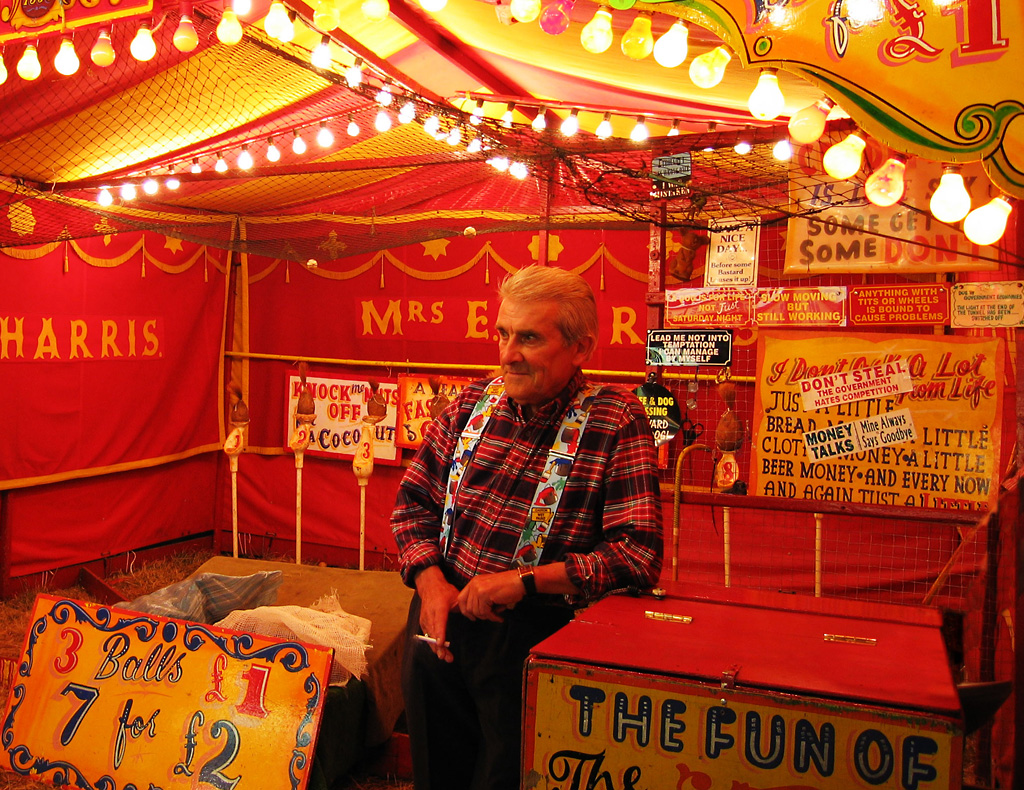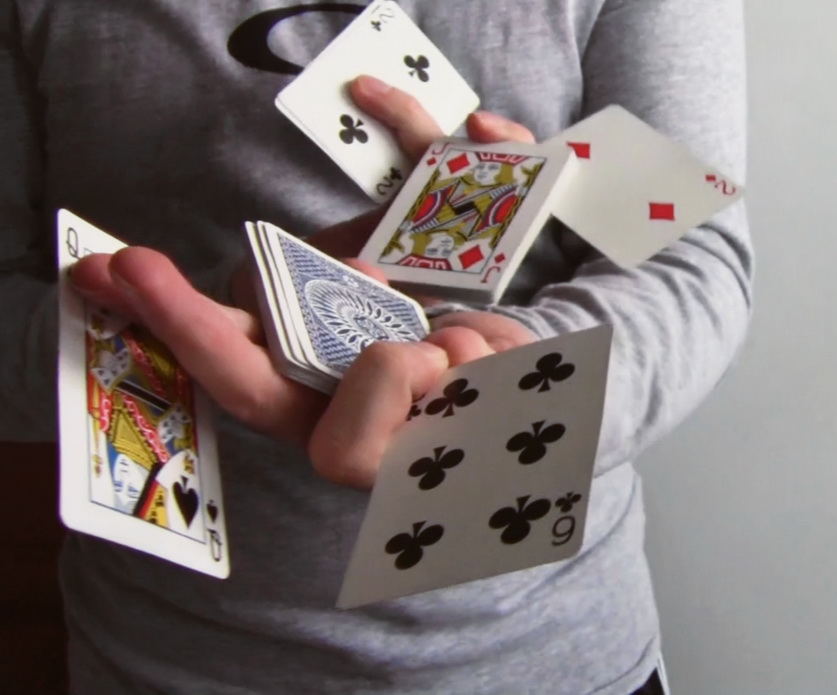|
Cranger Kirmes
The is a funfair in Germany, located near the Rhine–Herne Canal in in the city of Herne located in Metro Ruhr. It is the biggest funfair in the state of North Rhine-Westphalia and the second biggest fair in Germany, only behind the Munich Oktoberfest. In 2008 there were 4.7 million visitors. At an area of only and 500 show businesses it is called the "most overcrowded fair of the world". The fair is held annually for a period of 10 days from the first Friday in August. Visitor attractions include Ferris wheels, carousels, roller coasters, ghost trains, carnival games, food stalls, raffles and beer halls and gardens. On opening and closing day a fireworks show is presented. History The exact year of the first fair is unknown. During the 15th century a market to sell wild horses from the nearby riparian forests of the Emscher was established in Crange to be held around St Lawrence's Day, 10 August. Over the years, dancers, prestidigitators, jugglers, fortune tellers, magicia ... [...More Info...] [...Related Items...] OR: [Wikipedia] [Google] [Baidu] |
Beer Garden
A beer garden (German: ''Biergarten'') is an outdoor area in which beer and food are served, typically at shared tables shaded by trees. Beer gardens originated in Bavaria, of which Munich is the capital city, in the 19th century, and remain common in Southern Germany. They are usually attached to a brewery, beer hall, pub, or restaurant. History Facilities of this kind existed for example in Bamberg since 1605 under the German term "Bierkeller" ("Beer cellars"). At that time, the Archdiocese of Bamberg was directly subordinated to Rome and not yet to the Duchy of Bavaria. Hence, the first "Biergarten" in the strict sense of the term and of the decree of 1812 by the Kingdom of Bavaria developed at the beginning of 19th century in Munich. While it is unknown which brewery was first, it was likely one of Munich's big six: Löwenbräu, Hofbräuhaus, Augustinerbräu, Paulaner, Hacker-Pschorr and Spaten. Seasonal limitations on when beer could be brewed were already in the ... [...More Info...] [...Related Items...] OR: [Wikipedia] [Google] [Baidu] |
Festivals In Germany
{{Commons category, Festivals of Germany Germany Germany,, officially the Federal Republic of Germany, is a country in Central Europe. It is the second most populous country in Europe after Russia, and the most populous member state of the European Union. Germany is situated betwe ... Entertainment events in Germany Germny ... [...More Info...] [...Related Items...] OR: [Wikipedia] [Google] [Baidu] |
Annual Fairs , in biology
{{disambiguation ...
Annual may refer to: *Annual publication, periodical publications appearing regularly once per year **Yearbook **Literary annual *Annual plant *Annual report *Annual giving *Annual, Morocco, a settlement in northeastern Morocco *Annuals (band), a musical group See also * Annual Review (other) * Circannual cycle A circannual cycle is a biological process that occurs in living creatures over the period of approximately one year. This cycle was first discovered by Ebo Gwinner and Canadian biologist Ted Pengelley. It is classified as an Infradian rhythm, whi ... [...More Info...] [...Related Items...] OR: [Wikipedia] [Google] [Baidu] |
Ruhr Nachrichten
''Ruhr Nachrichten'' is a daily newspaper that has been published in Dortmund, Germany Germany,, officially the Federal Republic of Germany, is a country in Central Europe. It is the second most populous country in Europe after Russia, and the most populous member state of the European Union. Germany is situated betwe ... since 1949. The paper is published by Medienhaus Lensing in Rheinisch format. In 2001 ''Ruhr Nachrichten'' had a circulation of 225,000 copies. References External links * {{Authority control 1949 establishments in West Germany German-language newspapers Mass media in Dortmund Daily newspapers published in Germany Newspapers established in 1949 ... [...More Info...] [...Related Items...] OR: [Wikipedia] [Google] [Baidu] |
COVID-19 Pandemic In North Rhine-Westphalia
This article outlines the COVID-19 pandemic in the German federal state of North Rhine-Westphalia. As of April, there have been 19,384 confirmed cases, including 446 deaths. __TOC__ Timeline February 2020 On 15 February, some 300 people met in the densely packed citizencenter of Gangelt, Heinsberg (district), North Rhine-Westphalia for a carnival celebration. Bernd B., at this point already infected with SARS-CoV-2, performed onstage with his dance team."Heinsberg geht viral" taz.de 30 March 2020. On 25 February, a 47-year-old man, later identified as Bernd B., tested positive in , |
Kirmes (born 1995), Finnish artistic gymnast
{{disamb, surname ...
Kirmes may refer to: *Kirmes (also known as Kirchweih), festival dedicated to church's patron saint or the founding of local church in German-speaking countries **Kirmess or Kermesse, similar term in Dutch language *'' The Fair'' (German: ''Kirmes''), 1960 West German drama film *Oskar Kirmes Karl Oskar Kirmes (born 19 December 1995, Reykjavik, Iceland) is a Finnish male artistic gymnast representing his nation in international competitions. He was born in Reykjavik (Iceland) to Soviet Estonian born-dad and Swedish born-mom. His dad ... [...More Info...] [...Related Items...] OR: [Wikipedia] [Google] [Baidu] |
Ruhr
The Ruhr ( ; german: Ruhrgebiet , also ''Ruhrpott'' ), also referred to as the Ruhr area, sometimes Ruhr district, Ruhr region, or Ruhr valley, is a polycentric urban area in North Rhine-Westphalia, Germany. With a population density of 2,800/km2 and a population of over 5 million (2017), it is the largest urban area in Germany. It consists of several large cities bordered by the rivers Ruhr to the south, Rhine to the west, and Lippe to the north. In the southwest it borders the Bergisches Land. It is considered part of the larger Rhine-Ruhr metropolitan region of more than 10 million people, which is the third largest in Europe, behind only London and Paris. The Ruhr cities are, from west to east: Duisburg, Oberhausen, Bottrop, Mülheim an der Ruhr, Essen, Gelsenkirchen, Bochum, Herne, Hagen, Dortmund, Lünen, Bergkamen, Hamm and the districts of Wesel, Recklinghausen, Unna and Ennepe-Ruhr-Kreis. The most populous cities are Dortmund (with a population of approximately 588 ... [...More Info...] [...Related Items...] OR: [Wikipedia] [Google] [Baidu] |
Carny
Carny, also spelled carnie, is an informal term used in North America for a traveling carnival employee, and the language they use, particularly when the employee operates a game ("joint"), food stand ("grab", "popper" or "floss wagon"), or ride ("ride jock") at a carnival. The term "showie" is used synonymously in Australia, while "showman" is used in the United Kingdom. Etymology ''Carny'' is thought to have become popularized around 1931 in North America, when it was first colloquially used to describe one who works at a carnival. The word ''carnival'', originally meaning a "time of merrymaking before Lent" and referring to a time denoted by lawlessness (often ritualised under a lord of misrule figure and intended to show the consequences of social chaos), came into use around 1549. Carny language The carny vocabulary is traditionally part of carnival cant, a secret language. It is an ever-changing form of communication, in large part designed to be impossible to understand ... [...More Info...] [...Related Items...] OR: [Wikipedia] [Google] [Baidu] |
Fortune Teller
Fortune telling is the practice of predicting information about a person's life. Melton, J. Gordon. (2008). ''The Encyclopedia of Religious Phenomena''. Visible Ink Press. pp. 115-116. The scope of fortune telling is in principle identical with the practice of divination. The difference is that divination is the term used for predictions considered part of a religious ritual, invoking deities or spirits, while the term fortune telling implies a less serious or formal setting, even one of popular culture, where belief in occult workings behind the prediction is less prominent than the concept of suggestion, spiritual or practical advisory or affirmation. Historically, Pliny the Elder describes use of the crystal ball in the 1st century CE by soothsayers (''"crystallum orbis"'', later written in Medieval Latin by scribes as ''orbuculum''). Contemporary Western images of fortune telling grow out of folkloristic reception of Renaissance magic, specifically associated with R ... [...More Info...] [...Related Items...] OR: [Wikipedia] [Google] [Baidu] |
Prestidigitator
Sleight of hand (also known as prestidigitation or ''legerdemain'' ()) refers to fine motor skills when used by performing artists in different art forms to entertain or manipulate. It is closely associated with close-up magic, card magic, card flourishing and stealing. Because of its heavy use and practice by magicians, sleight of hand is often confused as a branch of magic; however, it is a separate genre of entertainment and many artists practice sleight of hand as an independent skill. Sleight of hand pioneers with worldwide acclaim include Dan and Dave, Ricky Jay, Derek DelGaudio, David Copperfield, Yann Frisch, Norbert Ferré, Dai Vernon, Cardini, Tony Slydini and Helder Guimarães. Etymology and history The word ''sleight'', meaning "the use of dexterity or cunning, especially so as to deceive", comes from the Old Norse. The phrase ''sleight of hand'' means "quick fingers" or "trickster fingers". Common synonyms of Latin and French include ''prestidigitation'' and ''leg ... [...More Info...] [...Related Items...] OR: [Wikipedia] [Google] [Baidu] |
Lawrence Of Rome
Saint Lawrence or Laurence ( la, Laurentius, lit. " laurelled"; 31 December AD 225 – 10 August 258) was one of the seven deacons of the city of Rome under Pope Sixtus II who were martyred in the persecution of the Christians that the Roman Emperor Valerian ordered in 258. Life St. Lawrence is thought to have been born on 31 December AD 225, in Valencia (or less probably, in Huesca), the town from which his parents came in the later region of Aragon that was then part of the Roman province of Hispania Tarraconensis. The martyrs Orentius (Modern Spanish: ) and Patientia (Modern Spanish: ) are traditionally held to have been his parents.Sts. Orentius and Patientia Catholic Online Lawrence encountered the future |






